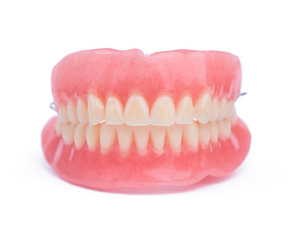
After getting dentures, you might feel like your food is a little less flavorful than you remember. This might be partially because your sense of taste weakens as you get older, but in some cases, it could also be a side effect of your new teeth. Here’s what you need to know about the link between dentures and taste – as well as the steps you can take to ensure your meals are still enjoyable.
How Can Dentures Affect Taste?
While partial dentures and full lower dentures tend to have little to no direct effect on your sense of taste, full upper dentures that cover the upper palate can potentially present problems. While most of your taste buds are on your tongue, some of them are also located on the roof of your mouth. If these taste buds end up being covered by an upper denture, you may experience a loss of taste, although how significant it is depends on the individual.
Your dentures might also indirectly affect taste if you need an adhesive to hold them in place. Said adhesives are often said to have a somewhat metallic taste, which could interfere with your enjoyment of foods. Similar problems can arise if you don’t clean your dentures regularly; food deposits and stains that build up over time might contribute to a loss of taste sensations.
What Can You Do to Improve Taste While Wearing Dentures?
For upper full dentures, sometimes all you need to do is wait. Once your brain gets used to the presence of dentures in your mouth, your sense of taste will often return to normal. That said, there are other steps you can take to minimize taste loss:
- Make sure that you’re cleaning your dentures thoroughly on a daily basis. Use a specialized denture cleanser that will help eliminate any food or plaque that has accumulated throughout the day. You can brush them with a soft-bristled toothbrush, but don’t use toothpaste, as it’s abrasive and could damage your prosthetic.
- If you rely too much on adhesive to prevent your dentures from slipping, they likely aren’t fitted properly. Reach out to your dentist to ask about having your dentures adjusted to help them stay in place.
- Consider switching to implant dentures. Upper full dentures supported by dental implants don’t require covering your upper palate; as such, they won’t get in the way of your taste buds.
Are you concerned about the way dentures might be affecting your sense of taste? Reach out to your dentist today. They can narrow down the true cause of the problem, and they can help you find a solution that will let you fully enjoy your new teeth without missing out on the rich flavors of your favorite meals.
About the Practice
Here at A New Smile, we have a variety of oral specialists under one roof so that we can fully meet our patients’ oral health needs. We can replace any number of teeth with lifelike dentures that have been fully customized for your specific mouth. To schedule a consultation with our team at our Pacoima office, visit our website or call (818) 897-5771.
